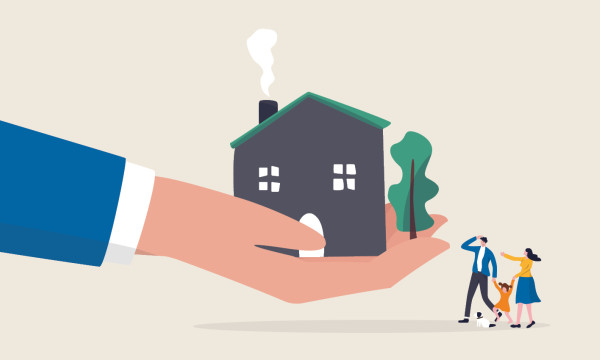Mortgage & Construction Loan FAQs
PMI is protection for the lender against loss if a borrower defaults. Typically for Conventional loans, PMI is required if your down payment is less than 20% of the purchase price. For example, on a purchase price of $100,000, PMI would be required if you put less than $20,000 (20% of $100,000) as a down payment. Other types of loans such as FHA, VA, and USDA have similar versions of PMI.
An appraisal is a report made by a qualified person, who sets forth an opinion or estimate of property value. Among other considerations of value, the appraisal uses recent local real estate sales activity as a major basis for valuation.
Closing costs cover all the fees and expenses associated with a loan transaction. Closing costs may include fees for an appraisal, credit report, title insurance, survey, and points. Closing costs vary depending upon the loan product.
Although each situation is different, there are several reasons to refinance including:
- To lower your monthly principal and interest payments.
- To move to a secure, fixed rate loan.
- To take cash out of the equity in your home.
For more information on refinancing your home, call 402-323-1128 in Lincoln, or toll-free 1-800-297-2837.
- Conventional Loans, including Fixed Rate and Jumbo Loans
- VA Loans, administered by the Department of Veteran Affairs
- FHA Loans, through the Federal Housing Administration
Yes, you or your builder will provide Union Bank with blueprints, a new home specification sheet, and contract. We will then arrange for an appraisal based on these plans and specs.
Your construction loan functions like a line of credit. You only pay interest on what you “use.” Your builder will submit draws monthly.
Once your home is complete your permanent mortgage loan (30, 20 or 15 year fixed) is nothing more than a refinance of the construction loan.
For specific questions related to your property escrow analysis, it’s best if you contact one of our Lincoln Nebraska based servicing specialists toll free at 833-560-1116. They will review your individual situation, talk through changes in your escrow, and assist with questions you have about your options.
The best way to regularly pay your mortgage is to login to your UBTgo account on a desktop computer or via our mobile app. After logging in, choose your mortgage from the list of accounts on your dashboard, then choose Make a Payment from the list of options.
If you prefer to write a check, those can be mailed to:
Union Bank & Trust
PO Box 82535
Lincoln NE 68501
Please remember to include a note stating that your check should be applied to your escrow shortage. Payments received by mail are credited as of date of receipt.
We have three options for you to pay your escrow shortage:
- Pay nothing and spread your shortage amount evenly across next year’s payments.
- Pay the full shortage now. Please note, if your tax or insurance premiums have increased, your monthly mortgage payment may still increase, even if you pay your shortage. Your monthly payment should update within five days of paying the shortage.
- Pay the shortage in part and leave the remaining shortage, spreading it out evenly across next year’s payments.
You sure can! If you notice that your insurance premiums are on the rise or your property valuation increased significantly, it’s a great idea to do some calculations to determine what your new payment will be with the changes. Click here for a handy calculator.
An escrow shortage occurs when the escrow account balance is below the required minimum balance during your escrow analysis. If your taxes and insurance are lower than expected, you might have an escrow surplus. If there’s a surplus of $50 or more, we’ll send a surplus check with your escrow analysis.
Some of the common reasons for an escrow shortage are:
- Your property taxes or insurance premiums increased
- Your taxes were reassessed
- Your insurance coverage changed
- The due date of your property taxes or insurance premiums changed
- You made fewer escrow payments into your escrow account than expected
Our mortgage team conducts all of the mortgage analyses in September and they’re sent out by the third week of the month. You can plan to receive your report at the end of September/beginning of October each year, depending on the mail service.
The escrow analysis we perform for you account each year helps us ensure there’s enough money in your escrow account to cover your taxes and insurance premiums. We’ll send you a summary statement called an escrow analysis. It includes a review of your payments and projections. This analysis helps us determine the amount needed each month for us to pay your taxes and insurance on your behalf.
An escrow account allows your financial institution to pay the required homeowners insurance and property taxes for you. You pay a portion of your taxes and insurance premiums with your monthly mortgage payment, and we hold them in a separate escrow account for you. When your taxes or insurance premiums come due, we pay them on your behalf with the funds in your escrow account.
Here are a couple ways to save on your mortgage:
- A surefire way to save on your mortgage is to pay extra. The extra amount is posted to your principal balance and will save you on interest on that amount.
- End your PMI period early. If you put down less than 20% on a conventional mortgage, you’ll be required to pay private mortgage insurance to protect your bank from default. Once you cross that 20% equity threshold, however, you’re no longer required to pay PMI. Making extra payments is a great way to cross that threshold!
- Improving your credit is another great way to pay less. The higher your credit score, the lower your interest rate — and that means less paid to the bank every month!
You can make your payment whenever the mood strikes. If you prefer to make payments every two weeks, you can use the instructions for online payments above to get it done. Please note that you’ll want to make sure your second payment pays the mortgage in full on or before your payment due date to avoid the payment being late.
That’s the best way to do it! We’ve made making a loan payment as easy as possible. Here’s how:
The best way to regularly pay your mortgage is to set up automatic loan payments through UBTgo on a desktop computer or via our mobile app. After logging in, choose your mortgage from the list of accounts on your dashboard, then choose Make a Payment from the list of options. Choose the recurring payments option and pick the day of the month you’d like your payments to automatically pull from your account.
One-time automated payments can be made using the instructions above and choosing the One-Time Payment option. Or make a one-time automatic payment via phone by calling 888-267-1262. (Fees may apply for this service.)
Great question! As you work on a mortgage with your loan officer, they’ll go over all the terms and conditions and give you a disclosure with an itemized list of what you can expect to pay every month. Most mortgages will include your principal payment, interest, and escrow. Click here to get an in-depth explanation of all these terms and more.




